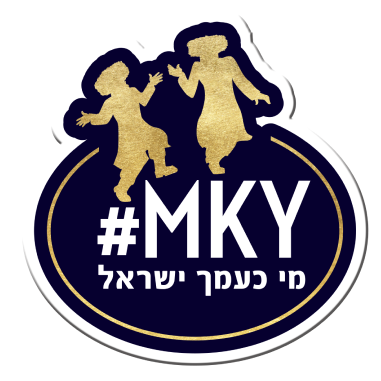
Gut Voch, As evident by the references, the piece below was originally written for Mishpacha Magazine’s Pesach edition. Because the author, #MKY Contributor Yisroel Besser, felt that the issue is relevant now, he opted not to wait and is instead sharing it here.
—
Generally, we aim for a certain tone in this column, trying to address real issues while still being tongue in cheek, relying on gentle humor to make these discussions a bit more pleasant.
I have no formal contract that says this, but the editors understand that every once in a while, a column can be more preachy and less cute. They, in turn, hope that the writer understands not to let this happen in a Yom Tov issue.
Gee. I don’t know what to say.
Anyhow, over the last decade or so, U.S politics went from being about ideological differences and opposing values to a very heated, very personal and very emotion-laden battle. For us or against us. Drink liberal tears. Media outlets take their place along these same lines, picking their audience then more or less telling them what they want to hear, stridently and emphatically, filled with antagonism and rage at the other side.
It is sad, because ideally there should be a shared ideal- love of country, for example, with the two main parties representing different approaches to how to best serve that country. Instead, what’s happened is that the country thing has fallen off to the side, discarded and forgotten by the combatants in this intense confrontation between good and evil, love and hate, whatever and whatever, that has occupied the masses.
So in fact, no one is winning, because it’s all short-term cheering or mourning, the country itself long forgotten.
If you liked this mashal, buckle up for the uncomfortable nimshal.
It is WZO election season.
There are great talmidei chachamim who feel this is an opportunity not to be missed- the chance to have Torah-true representation in that body and direct some of its ample resources toward holy causes- and just as important, divert those resources from those who actively seek to undermine Yiddishkeit.
There are great talmidei chachamim who feel that the body itself was founded with the specific intention of replacing the Torah as our national identity, a rebellion against the One Who gave the Torah, and to join forces- even for a worthy goal- is forbidden.
Imagine, chas v’shalom, we start arguing about this, families around the Yom Tov table, shvoggers on a chol hamoed trip waiting on line for the roller coaster, cousins gone to visit Zaidy at the same time.
Imagine it gets personal.
Both positions are associated with legitimate gedolei Torah and the inevitable result of discussing the topic is that people will opine and speculate about why the ‘other’ side is wrong.
This gadol didn’t really mean it and that one was forced. The next one was taken out of context and the fourth one isn’t really so up to date anymore.
So this Pesach, here is my proposal.
Whether you vote, or whether you will not vote- don’t tell anyone. Keep it a secret! When the guy next to you in shul raises an eyebrow and says “Nu? Lemaaseh, did you vote or not?” shrug primly and tell him you’re keeping the answer to that question a secret.
End conversation.
But, you will argue, how can you be silent when there is an obligation to tell the oblivious guy just how big of a chiyuv/issur it is to vote! Don’t you have an achrayus to educate him?
Hear me out. Let’s say you hold there is an obligation to participate in the elections because we have to keep the liberal movements out of Eretz Yisroel, to keep our mekomos hakedoshim holy, to weaken the influence of anti-Torah forces across the diaspora.
By neglecting to vote, your friend is wasting a chance to make a difference and he is thus guilty of empowering our opponents. That’s bad, but there is something worse.
The Mishna tell us that every single Yid has a share in olam haba’ah. But there’s another part to the Mishna, lesser known because the lyrics aren’t as singable.
These are the ones who have no cheilek in olam haba’ah…and an apikores.
The Gemara qualifies what is meant by apikores: one who is mevazeh a talmid chacham. (Sanhedrin 99b).
Rabbeinu Yonah ( Shaarei Teshuvah 3,148) gives several reasons why this behavior merits such a severe punishment.
The more respect given to the talmid chacham, the more their words are heard and, by extension, the more common folk will have a desire to know Torah, the purpose of creation. When the simple person sees the grandeur of the Torah, he will recognize its sanctity and become closer to Hashem.
Finally, Rabbeinu Yonah says, when people disparage a talmid chacham, they might have a reason– maybe they don’t like how he looks, dresses or parks his car. Maybe they don’t agree with a position he has taken.
What they are saying is, it’s true, Torah is important, but the fact that this talmid chacham did this, went here, didn’t go here, or holds like that makes him worthy of my disdain: that means that Torah itself is less important to you then whatever that side issue is.
Now, let’s say you hold it forbidden to vote in these elections because a Jew cannot give credibility to an organization that does not accept that the Torah was given at Sinai and that it continues to bind us, and increased funding or spiritual influence does not justify it.
By voting, your friend is declaring that he is part of a movement formed to rewrite the rules of Yiddisheit. How can you stand silently by?
The answer is, terrible as that is, there is something worse.
See the bold letters above.
If you vote and you talk about it, you run a very serious risk, because the inevitable first question will be “But how can you go against….”
Don’t fall for it.
It is certain that not every talmid chacham has a clear answer on this. He must have been ignorant, because he answered every question he was asked, said Voltaire. (I googled that: the quote I once heard, but about Voltaire, I don’t know anything except that he’s also the guy from Rabbi Frand’s legendary Siyum Hashas speech- don’t let perfect be the enemy of the good. So far, he’s two for two.)
It is a sugya with mareh mekomos, and it must be learned just like any other sugya.
Ask whomever you ask, get your marching orders, follow them, and zehu. No follow-up. No justifying. No guilting others.
What should you talk to your shvoggers about at the Yom Tov meal?
Go back to deliberating about Pesach hotels, they’re always good for debate. Surely, you can look through the hefty magazine and find an offensive ad to discuss. You can play a game with your family and figure out which singer will be at the most programs and concerts, and see if it’s all possible, factoring in travel time and time-zone changes, for him to be doing it on his own, without a double. You can speculate why the Rasha in all the kids Haggadah handouts from school wears a backward baseball cap.
Then, you can take a minute to contemplate that the guy with the backward cap, on his skateboard (or, alternatively, holding a baseball bat) might scoot right by you in the next world, if you’re not careful.
Gut Yom Tov.
